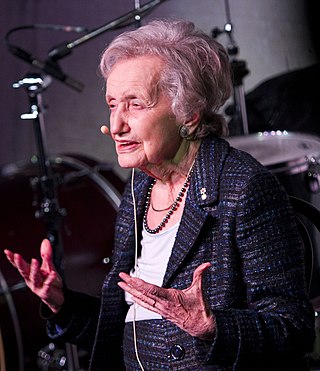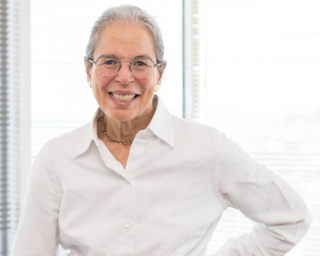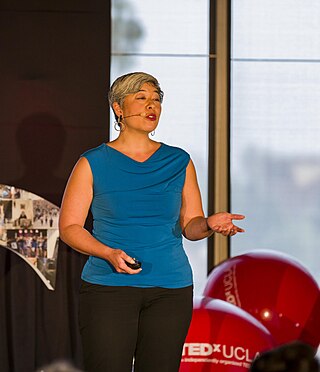Related Research Articles
Psychology is the scientific study of mind and behavior. Its subject matter includes the behavior of humans and nonhumans, both conscious and unconscious phenomena, and mental processes such as thoughts, feelings, and motives. Psychology is an academic discipline of immense scope, crossing the boundaries between the natural and social sciences. Biological psychologists seek an understanding of the emergent properties of brains, linking the discipline to neuroscience. As social scientists, psychologists aim to understand the behavior of individuals and groups.

Brenda Milner is a British-Canadian neuropsychologist who has contributed extensively to the research literature on various topics in the field of clinical neuropsychology. Milner is a professor in the Department of Neurology and Neurosurgery at McGill University and a professor of Psychology at the Montreal Neurological Institute. As of 2020, she holds more than 25 honorary degrees and she continued to work in her nineties. Her current work covers many aspects of neuropsychology including her lifelong interest in the involvement of the temporal lobes in episodic memory. She is sometimes referred to as the founder of neuropsychology and has been essential in its development. She received the Balzan Prize for Cognitive Neuroscience in 2009, and the Kavli Prize in Neuroscience, together with John O'Keefe, and Marcus E. Raichle, in 2014. She turned 100 in July 2018 and at the time was still overseeing the work of researchers.

Lisa Feldman Barrett is a Canadian-American psychologist. She is a University Distinguished Professor of psychology at Northeastern University, where she focuses on affective science and co-directs the Interdisciplinary Affective Science Laboratory. She has received both of the highest scientific honors in the field of psychology, the William James Fellow Award from the Association for Psychological Science for 2025, and the Award for Distinguished Scientific Contributions from the American Psychological Association for 2021. Along with James Russell, she is the founding editor-in-chief of the journal Emotion Review. Along with James Gross, she founded the Society for Affective Science.
Priscilla K. Coleman is a retired Professor of Human Development and Family Studies in the School of Family and Consumer Sciences at Bowling Green State University, Ohio. She is the author of a number of disputed academic papers, which claim to have found a statistical correlation or causal relationship between abortion and mental health problems.
Nilanjana Dasgupta is a social psychologist whose work focuses on the effects of social contexts on implicit stereotypes - particularly on factors that insulate women in STEM fields from harmful stereotypes which suggest that females perform poorly in such areas. Dasgupta is a professor of Psychology and is the Director of the Institute of Diversity Sciences and the University of Massachusetts, Amherst.

Kay Deaux is an American social psychologist known for her pioneering research on immigration and feminist identity. Deaux is Distinguished Professor Emerita at the Department of Psychology at the Graduate Center of the City University of New York (CUNY). According to Brenda Major, Deaux's work centers on the question of how social categories affect one's psychological makeup, social behavior, and life outcomes, while emphasizing the subjectivity of people's identities and experiences and the larger social context.
Mary Klevjord Rothbart is professor emerita of psychology at the University of Oregon. She is known for her research in the fields of temperament and social development, emotional development, and development of attention. She was a co-founder of Birth to Three, a parent support and education program. She has written over 159 articles related to educational psychology, developmental psychology, developmental cognitive neuroscience and biological psychology. Rothbart has also authored and co-authored many books, including Becoming Who We Are, for which she received the Eleanor Maccoby Book Award from the American Psychological Association. Two other popular volumes by Rothbart are Temperament, a Handbook of Child Psychology, and Attention in Early Development: Themes and Variations.
Diane M. Mackie is a social psychologist known for her research in the fields of intergroup relations and social influence. She is Professor Emerita of Psychological and Brain Sciences at the University of California, Santa Barbara.
Jeanne Lavonne Humphrey Block was an American psychologist and expert on child development. She conducted research on sex-role socialization and theories of personality. Block was a fellow of the American Association for the Advancement of Science and conducted her research with the National Institute of Mental Health and the University of California, Berkeley. She retired in 1981 after being diagnosed with cancer, and died in December of the same year.

Nancy Elinor Adler was an American health psychologist. She was the Lisa and John Pritzker Professor of Medical Psychology at the University of California, San Francisco (UCSF), and director of UCSF's Center for Health and Community Sciences. Adler was known for her research on health behaviors, health disparities, and social determinants of health.
Batja Mesquita is a Dutch social psychologist, a cultural psychologist and an affective scientist. She is a professor of psychology at the University of Leuven, Belgium, where she studies the role of culture in emotions, and of emotions in culture and society. She is director of the Center for Social and Cultural Psychology in Leuven.
Sandra L. Murray is Professor of Psychology at the University at Buffalo, State University of New York. She is a social psychologist known for her work on close relationships and their trajectories over time. Murray received the American Psychological Association Award for Distinguished Scientific Early Career Contributions to Psychology in 2003 for "distinguished and original contributions to an understanding of motivated social cognition in relationships." Other awards include the New Contribution Award from the International Society for the Study of Personal Relationships in 1998 and 2000, the Outstanding Early Career Award from the International Society for Self and Identity in 2000, the Career Trajectory Award from the Society of Experimental Social Psychology in 2012, the Mid-Career Distinguished Contribution Award from the International Association for Relationship Research in 2016, and the SUNY Chancellor's Award for Excellence in Scholarship and Creative Activities in 2020.

Stacey Sinclair is an American psychologist and professor of psychology and public affairs, and associate professor of African American studies at Princeton University. Her research focuses on how interpersonal interactions translate culturally held prejudices into individual thoughts and actions.
Paula R. Pietromonaco is an American psychologist and principal investigator of the Growth in Early Marriage Project at University of Massachusetts, Amherst. She is the editor-in-chief of the journal Emotion, as well as the associate editor of Journal of Personality and Social Psychology: Interpersonal Relations and Group Processes section.
Heejung Kim is a South Korean psychologist and a professor in the Department of Psychological & Brain Sciences at the University of California, Santa Barbara. Her research focuses on how culture influences humans' thought process. She is co-editor of the journal Personality and Social Psychology Review.
Jennifer Lynn Eberhardt is an American social psychologist who is currently a professor in the Department of Psychology at Stanford University. Eberhardt has been responsible for major contributions on investigating the consequences of the psychological association between race and crime through methods such as field studies and laboratory studies. She has also contributed to research on unconscious bias, including demonstrating how racial imagery and judgment affect culture and society within the domain of social justice. The results from her work have contributed to training law enforcement officers and state agencies to better their judgments through implicit bias training. She has also provided directions for future research in this domain and brought attention to mistreatment in communities due to biases.
Abigail Marsh is an American psychologist and neuroscientist who works as a professor at Georgetown University's Department of Psychology and the Interdisciplinary Neuroscience Program, where she is the director of the Laboratory on Social and Affective Neuroscience.

Tania Israel is an American psychologist and professor in the Gevirtz Graduate School of Education at the University of California, Santa Barbara (UCSB). Her research focuses on the development and implementation of interventions to support the mental health and well-being of LGBTQ individuals and communities. Israel has presented about dialogue across political lines and is the author of Beyond Your Bubble: How to Connect Across the Political Divide, Skills and Strategies for Conversations That Work and Facing the Fracture: How to Navigate the Challenges of Living in a Divided Nation. She is also known for writing song lyrics, memoir, and bisexual haiku.
Katherine L. Milkman is an American economist who is the James G. Dinan endowed Professor at The Wharton School of the University of Pennsylvania. She was previously the President of the Society for Judgment and Decision Making.
David Lewis Hamilton is an American social psychologist and researcher currently working at the University of California, Santa Barbara.
References
- ↑ "Brenda Major". Library of Congress Name Authority File. Library of Congress . Retrieved 15 May 2017.
- ↑ "Self & Social Identity Lab". Department of Psychological and Brain Sciences Website. University of California, Santa Barbara . Retrieved 15 May 2017.
- ↑ "2012 HHS Award Recipients". Purdue University . Retrieved 15 May 2017.
- ↑ "Brenda Major". Social Psychology Network . Retrieved 15 May 2017.
- ↑ "Brenda Major C.V." (PDF). Retrieved 15 May 2017.
- 1 2 3 "Brenda Major". Department of Psychological and Brain Sciences Website. University of California, Santa Barbara . Retrieved 15 May 2017.
- ↑ Bazelon, Emily (21 January 2007). "Is There a Post-Abortion Syndrome?". The New York Times Magazine . Retrieved 15 May 2017.
- ↑ Healy, Melissa (15 December 2016). "Abortions don't lead to long-term mental health problems for women, but being denied causes anxiety, study suggests". Los Angeles Times . Retrieved 15 May 2017.
- ↑ Carey, Benedict (13 August 2008). "Abortion Does Not Cause Mental Illness, Panel Says". The New York Times . Retrieved 15 May 2017.
- ↑ Kay, Katty; Shipman, Claire (May 2014). "The Confidence Gap". The Atlantic . Retrieved 15 May 2017.
- ↑ Keith, Tamara (5 May 2014). "Best Way To Get Women To Run For Office? Ask Repeatedly". NPR . Retrieved 15 May 2017.
- ↑ Major, B.; Blodorn, A.; Major Blascovich, G. (20 October 2016). "The threat of increasing diversity: Why many White Americans support Trump in the 2016 presidential election". Group Processes & Intergroup Relations . 21 (6): 931–940. doi:10.1177/1368430216677304. S2CID 151980151.
- Tom Jacobs (26 October 2016). "Among Trump Supporters, There's a Real Fear of Whites Becoming the American Minority". Pacific Standard .
- ↑ "2019 Fellows and International Honorary Members with their affiliations at the time of election". members.amacad.org. Archived from the original on 2020-03-02.
- ↑ "National Academy of Sciences Elects Members and International Members". www.nasonline.org. 30 April 2024. Retrieved 12 May 2024.